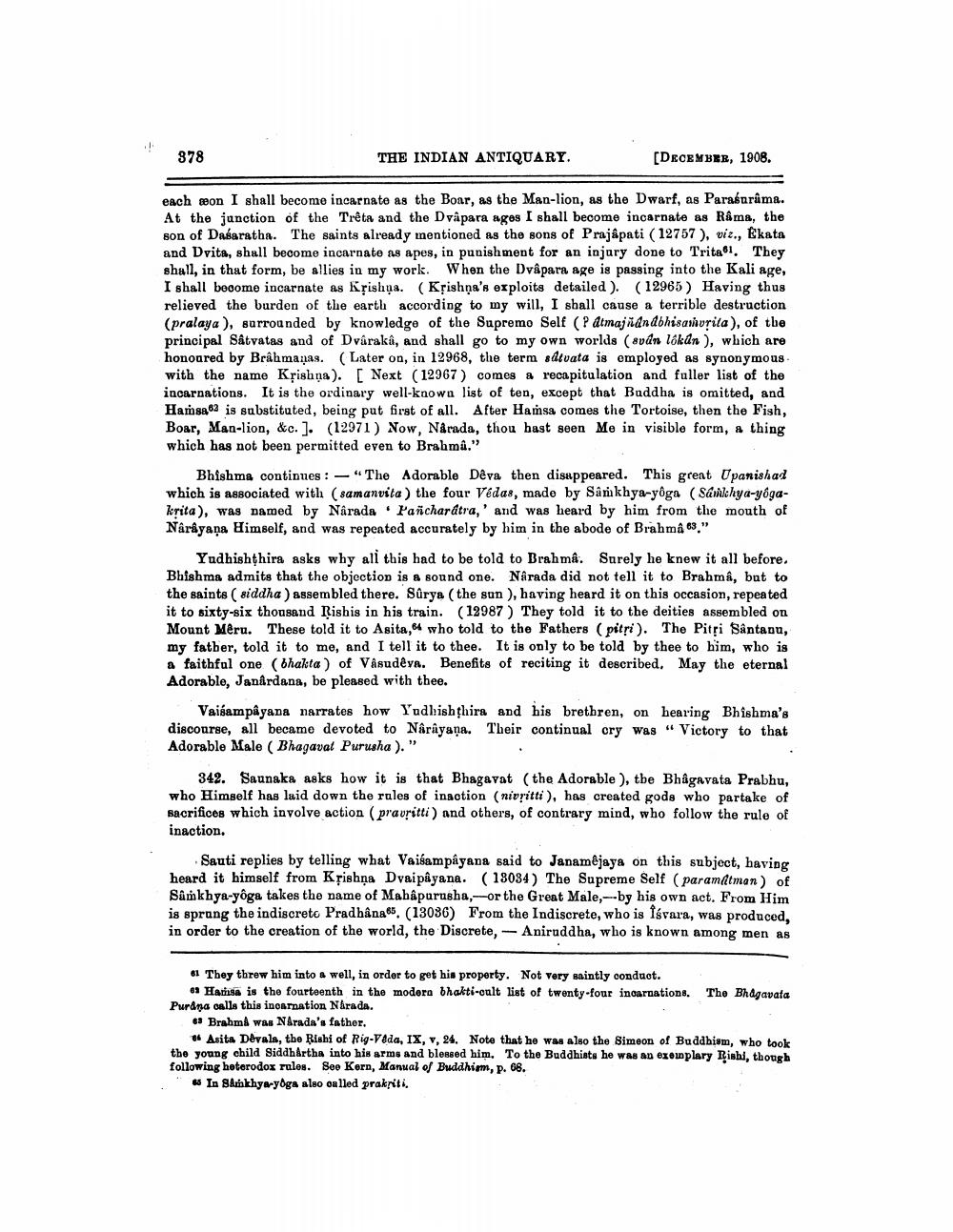________________
378
THE INDIAN ANTIQUARY.
[DECEMBER, 1908.
each won I shall become incarnate as the Boar, as the Man-lion, as the Dwarf, as Parasurama. At the junction of the Trêta and the Dvâpara ages I shall become incarnate as Rama, the son of Dasaratha. The saints already mentioned as the sons of Prajapati (12757), viz., Ekata and Drita, shall become incarnate as apes, in punishment for an injury done to Trital. They shall, in that form, be allies in my work. When the Dvâpara age is passing into the Kali age, I shall become incarnate as Krishna. (Kțishna's exploits detailed ). (12965) Having thus relieved the burden of the earth according to my will, I shall cause a terrible destruction (pralaya), surrounded by knowledge of the Supremo Self (Pdtmajdndbhisanurita), of the principal Såtvatas and of Dváraků, and shall go to my own worlds (sván lókun ), which are honoured by Brahmanas. (Later on, in 12968, the term sdtvata is employed as synonymous with the name Krishna). [ Next (12967) comes a recapitulation and fuller list of the incarnations. It is the ordinary well-known list of ten, except that Buddha is omitted, and Hamsa62 is substituted, being put first of all. After Hamsa comes the Tortoise, then the Fish, Boar, Man-lion, &c.]. (12971 ) Now, Nárada, thou hast seen Me in visible form, a thing which has not been permitted even to Brahma."
Bhishma continues : - "The Adorable Déva then disappeared. This great Upanishad which is associated with (samanvita) the four Védas, made by Sankhya-yoga (Sankhya-yogakrita), was named by Närada Pancharátra,' and was heard by him from the mouth of Narayana Himself, and was repeated accurately by him in the abode of Brahma 63."
Yudhishthira asks why all this had to be told to Brahmâ. Surely he knew it all before. Bhishma admits that the objection is a sound one. Nárada did not tell it to Brahmâ, but to the saints ( siddha ) assembled there. Surya (the sun ), having heard it on this occasion, repeated it to sixty-six thousand Rishis in his train. (12987) They told it to the deities assembled on Mount Meru. These told it to Asita, 64 who told to the Fathers pitri). The Pitsi Santana, my father, told it to me, and I tell it to thee. It is only to be told by thee to him, who is
faithful one (bhakta ) of Vasudeva. Benefits of reciting it described. May the eternal Adorable, Janardana, be pleased with thee.
Vaisampâyana narrates how Yudhishthira and his brethren, on hearing Bhishma's discourse, all became devoted to Narayana. Their continual cry was “Victory to that Adorable Male ( Bhagavat Purusha )."
342. Saunaka asks how it is that Bhagavat (the Adorable ), the Bhagavata Prabhu, who Himself has laid down the rules of inaction (nivritti), has created gode who partake of sacrifices which involve action (pravritti) and others, of contrary mind, who follow the rule of inaction.
Sauti replies by telling what Vaišampayana said to Janamêjaya on this subject, having heard it himself from Kțishna Dvaipayana. (18034) The Supreme Self (paramatman) of Samkhya-yoga takes the name of Mahapurusha,-or the Great Male -- by his own act. From Him is sprang the indiscreto Pradhâna 5. (13036) From the Indiscrete, who is Isvara, was produced, in order to the creation of the world, the Discrete, - Aniruddha, who is known among men as
& They throw him into a well, in order to get his property. Not very saintly conduct.
1 Hamsa is the fourteenth in the modera bhakti-cult list of twenty-four incarnations. The Bhagavata Purana calls this incarnation Närada.
65 Brahmd was Nárada's father,
#Asits Dévals, the Rishi of Rig Vada, IX, V, 24. Note that he was also the Simeon of Buddhism, who took the young child Siddharths into his arms and blessed him. To the Buddhists he was an exemplary Linhi, though following hoterodox rules. See Korn, Manual of Buddhism, p. 68. * In Sunkhyaryoga also oalled prakriti.




